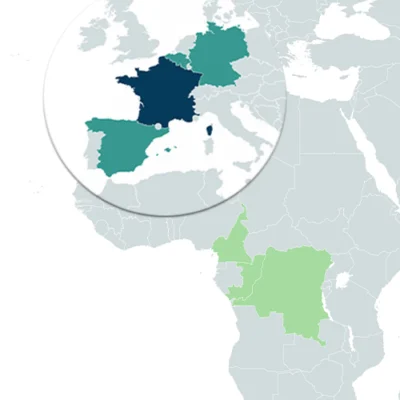
Toward a biome-scale monitoring of the Congo basin Forest Functional composition
Call
Duration
01/03/2024 – 28/02/2027
Total grant
Approx. 702 tshd. €
More information
Raphaël PÉLISSIER
raphael.pelissier@ird.fr Website: https://coforfunc.eu X: @CoForFunc
Partners of the project
- IRD-AMAP lab, Laboratory of botAny and Modeling of Plant Architecture and vegetation, Montpellier University, France
- MPI-BGC, Max Planck Institute for Biogeochemistry, Department of Biogeochemical Integration, Jena, Germany
- CREAF, Ecological and Forestry Applications Research Centre, Barcelona, Spain
- Gembloux Agro-Bio Tech, Liège University, Belgium
- LaboSystE, Plant Systematics and Ecology Laboratory, Higher Teacher’s Training College, Yaoundé University, Cameroon
- ENEF, National Water and Forestry School, Mbalmayo, Cameroon
- ISSGEA, Higher Institute of Geographic, Environmental and Planning Sciences, Denis Sassou- N’Guesso University, Brazzaville, Congo Republic
- ERAIFT, Regional Post-Graduate Training School on Integrated Management of Tropical Forests and Lands, Kinshasa University, Democratic Republic of Congo

Context
Expected strong climate, demographic and economic changes in Central Africa threaten the sustainability of ecological, social, and economic services that the Congo Basin Forests (CBF), the second World’s largest rainforest, provide to humanity. In addition to deforestation, anthropogenic environmental impacts will lead to dramatic changes in forest tree functional composition with potential deleterious feedbacks on carbon and water cycles among other services.
Main objectives
Through a unique European research consortium and transnational collaborations with Central African country experts, CoForFunc aims at developing an integrated approach for the monitoring of tree functional diversity of the CBF to support biome-scale assessment of their vulnerability to expected climate change and human-induced transformations. Such monitoring requires (i) initiatives that go beyond national scales, and (ii) indicators derived from primary observations that inform the state and dynamics of Essential Biodiversity Variables (EBVs). This work will contribute pragmatically to the post-2020 goals of the Convention on Biological Diversity that call for improved integration of biodiversity data for supporting management, conservation and restoration actions. It also supports the 2022 United Nations Biodiversity Conference of the Parties (COP15) engagement to reach 30% protected areas globally by 2030, which need to matter for both biodiversity and people, and account for their vulnerability to ongoing global changes.
Main activities
Activities are geared towards resolving key challenges, specifically to:
- gather, harmonise and share existing data to provide ground-truth estimates of multiple dimensions of tree diversity in the CBF;
- connect existing forest plots to develop a regional network of observatories for a consistent monitoring of functional dynamics;
- characterise variation in functioning of canopy species along environmental gradients, combining in situ phenological, ecophysiological and functional trait measurements;
- develop an upscaling chain from field data, to proximal (drone) and intermediate high- and coarse-resolution (satellite) remote sensing data, especially time- series of images provided by recent and upcoming Earth Observation Systems, to quantify biome-scale EBVs;
- combine biome-scale EBVs and environmental drivers to assess CBF vulnerability to expected changes (based on trend analyses and space-for-time substitution approaches).
The project relies on close collaborations with self-financed African academic partners (universities), as well as operational (forest and conservation) services for the development of the forest observatories, which includes technology transfer and capacity development actions. Project outcome will be disseminated by leveraging central African stakeholder networks, such as the Research Network on Central African Forests (R2Fac), the Central African Forest Commission (COMIFAC) and the UNESCO Regional Post-Graduate Training School on Integrated Management of Tropical Forests and Lands (ERAIFT).



